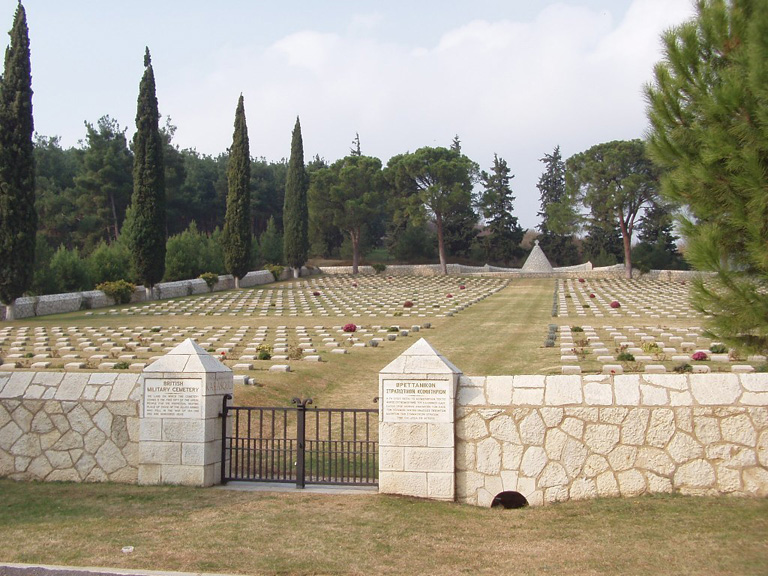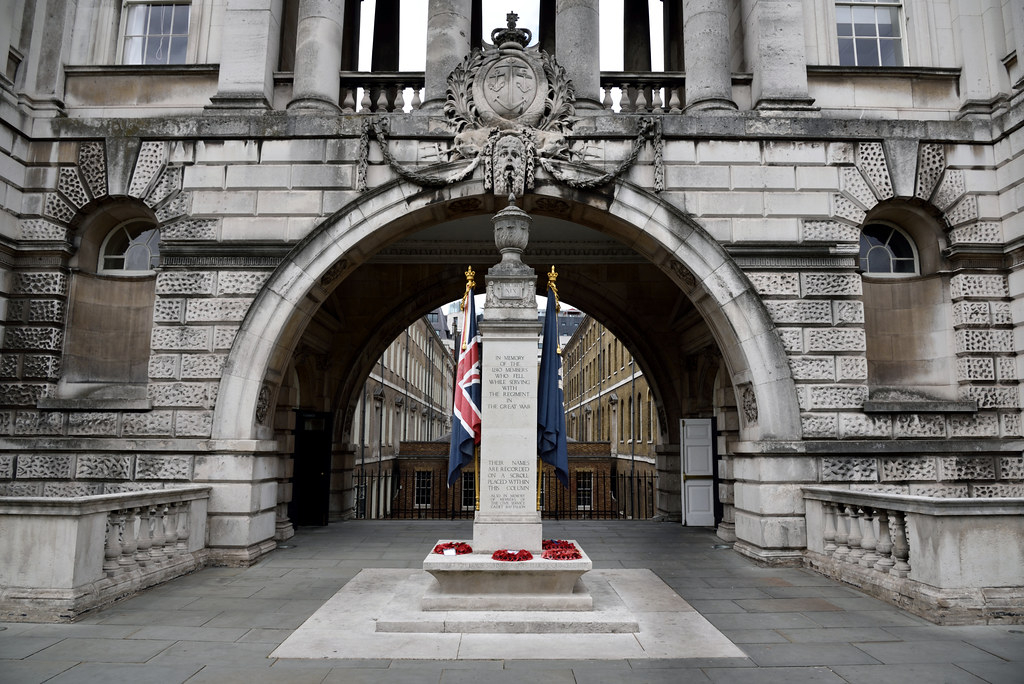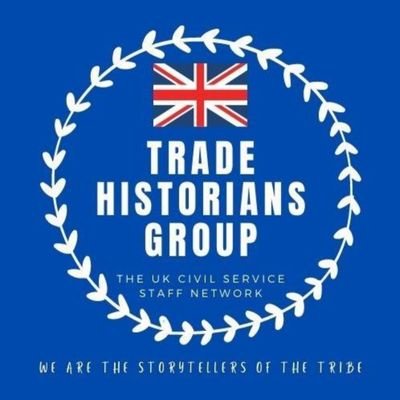- See Hyman Goss’s entry on the Board of Trade’s Ancestry public tree.
- This information updates the group’s previous research published on the former DTI website (now archived by the National Archives).
- Do you have any more information about Hyman Goss? If so the War Memorial Research Group would love to hear from you
Name recorded on Board of Trade Memorial: H. Goss
Born: 15 August 1895, Mile End Old Town, London, England
Date of Death: 13 May 1917
Age at death: 21
Service, Regiment, Corps, etc: London Regiment
Unit, Ship, etc: 2/15th Battalion (Civil Service Rifles)
Enlisted: London
Rank: Private (Service No: 4961 and 532248)
Decorations: WW1 Service Medals (British War Medal and Victory Medal)
War (and theatre): WW1 (Balkans)
Manner of Death: Died of Wounds (DOW)
Family Details: Son of Moses and Susan Goss. Brother of Joseph Goss, 31 Connaught Road, London
Residence: Stroud Green
Home Department: Board of Trade – Labour Department (Central Office)
Civilian Rank:
Cemetery or Memorial: Karasouli Military Cemetery, Greece (F.1268); Board of Trade War Memorial; Memorial to Staff of the Ministry of Labour, Caxton House, Tothill Street, London; Civil Service Rifles Memorial, Somerset House, London
Biography:

Hyman Goss’s life and death is a chance to reflect on the different paths we all choose to take. Whilst huge swathes of men enlisted either voluntarily or following conscription, many more – around 16,000 to 17,000 British men – refused to fight for a range of moral, ethical or religious reasons. They were known as conscientious objectors. These dividing lines cut across the Goss family.
Hyman Goss (or Gostomski was born on 15 August 1895 in Mile End Old Town. His parents were Moses Aaron Gostomski (1852-1904) and Susan Levy (1853-1935). He had five brothers – Samuel, Isaac (1880-1943), Solomon, Louis and Joseph (1890-?) and four sisters – Sophia, Mary, Rosa and Leah. His father was a tailor by profession (owning a business in Newgate Street, London) and was of Polish/Russian origin. Moses and Susan and had emigrated from The Pale of Settlement probably in the early 1870s.
The family were originally Jewish (based on circumstantial evidence) but the family name was changed to Goss in 1910.
According to census records the Gostomski family were living at 115 St John Street Road, Clerkenwell in the 1901 census. Moses is working as a tailor and young Hyman is at school aged 6 years old. We know from his early life that Hyman attended aged 8 years old from 31 August 1903, the Hugh Myddleton School in Islington (which was first opened in December 1893 by the Prince of Wales (later King Edward VII). Just a year later in 1904, his father sadly died aged 53.
Ten years later, Susan Goss is living at 29 Lidfield Road, Stoke Newington. Susan is a widow (aged 56) living with three of her son’s (including Hyman), three daughters and a young grandson. Hyman is by now aged 15 and working as a Boy Clerk in the Civil Service in the Money Order Department. His brothers Isaac and Joseph were tailors, like their father
During WW1, we know that Hyman served in the 2/15th Battalion (Civil Service Rifles) and can give a picture of the battalion’s WW1 wartime movements. The battalion was a second line Territorial force formed at Somerset House in September 1914. The battalion was initially based in Maidstone in January 1915 before moving to Watford in April 1915 and then Saffron Walden in June 1915 and Sutton Veny in January 1916 to prepare for overseas war service. However, because of the Irish Rebellion, the battalion was sent to Cork in Ireland for security duties. The battalion was based at Ballincollig and then Macroom. On 14 May 1916, the battalion returned to England and returned to train at Sutton Veny. The battalion were posted to France on 22 June 1916. In September 1916 they were sent to Salonika, travelling by train firstly to Marseilles and then sailing to Malta. The battalion eventually arrived in Salonika on 25 December 1916.

In 1917, the battalion fought in the Battles of Doiran in April and May 1917. Doiran was a key strategic area and a location of fierce fighting between 1917 and 1918. By April 1917, Britain and her Allies were looking for military success on this Southern European front and were leading up to launch an attack on Bulgarian positions on Lake Doiran to coincide with the Nivelle Offensive by French troops on the Western Front (which took place a few days later from 24 April 1917). This was extremely challenging as Bulgarian forces had fought back a previous Franco-British assault in August 1916 and had been reinforced. The battle began on 22 April with a huge 4 day artillery barrage followed by British attacks. The Bulgarians however reinforced their positions and their commander Vladimir Vazov became a hero. The battle raged until 9 May 1916 when the British abandoned all their attacks.
In all suffered huge military loses with 12,000 men who were either killed, wounded or captured during the Battle of Doiran.
However, whilst Hyman chose to enlist, two of his brothers’ Joseph Goss and Isaac Goss were both conscientious objectors.


We know that Joseph was a member of the Independent Labour Party, the Fellowship of Reconciliation and the No Conscription Fellowship. He was also a Quaker. Joseph applied as a “conscientious objector” on 28 March 1916 on religious grounds and was granted “exemption from combative service only”. Joseph appealed against the decision at a local tribunal hearing in Hornsey and was offered an exemption from non-combative service if willing to undertake work of national importance as directed by the Pelham Committee ( Board of Trade committee chaired by senior civil servant, T. H. W. Pelham (also known as the Committee on Work of National Importance). Joseph is known to have declined this offer and his appeal was dismissed. In May 1916, Joseph appealed for a variation to his certificate of exemption and requested a hearing at the Central Tribunal. His appeal for an absolute exemption was again dismissed. He continued to protest in a letter to the Appeal Tribunal written in July and then again in August 1916. The local press reported 18 August 1916 that he was fined 40 shillings and he was handed to the military authorities. Joseph however, went absent and was then arrested on 3 October 1916. He was sent to Mill Hill Barracks to be court martialled. Joseph tried to present documents indicating that he had an exemption from service on both combative and non-combative grounds. However, he was again unsuccessful and was sentenced to 6 months hard labour in Wormwood Scrubs prison. Joseph then faced a continuous and pointless cycle of being released, followed by being court martialled yet again and sent back to prison a further two times. Finally in April 1919, he was released by the Secretary of State under the two year rule, having served three years in prison. Joseph’s wartime experiences were typical of many other extreme and absolute conscientious objectors.
Isaac, meanwhile was a married man with four children. He was active in his local community, being a secretary for the London County Council School Care Committee and also running a Sunday School and Boys Club and summer camps. Like Joseph, he applied in September 1916 to the Hornsey Tribunal for an absolute exemption from military service but like his brother and other conscientious objectors was only given an exemption from combative service to do work of national importance. He also appealed (like Joseph) in November 1916 to the Middlesex Tribunal and on 16 November 1916 he declined the work offer from the Pelham Committee. He received a letter in December 1916 stating a deadline to appear for work or risk being called up, to which he refused to reply. As a result he was arrested for absenteeism. Like his brother, he was also sent to Mill Hill Barracks. He was characterised as a “thorn in the side” of the local Tribunal.
Meanwhile, Hyman died on 13 May 1917 aged only 21 years old during the Salonika military campaign. This area of WW1 fighting is less familiar in popular memory but was characterised by harsh conditions and disease (notably malaria). We know that Hyman died of his wounds.
He is buried in a Commonwealth War Grave at Karasouli Military Cemetery which is located on the edge of Polykastro (formerly Karasouli). This was a base for casualty clearing stations. He is one of 1,421 Commonwealth WW1 burials in the cemetery (including 56 unidentified graves).


This cemetery is also the final resting place of fellow Board of Trade employee, Reginald Arthur McGuire who died a month previously on 12 April 1917.
He is also remembered by the Board of Trade War Memorial, the Memorial to the Staff of the Ministry of Labour and by a scroll located within the Civil Service Rifles Memorial located at Somerset House, London.
Despite his Jewish ancestry, Hyman’s name is not recorded in the British Jewry Book of Honour (1922) that serves a permanent record of the service of 50,000 Jews who served in the British and colonial forces during WW1.
We don’t know what Hyman thought of his brother’s principled stand in opposition to WW1. However conscientious objectors (also known as ‘conchies’ or ‘shirkers’) were widely shunned by others. In turn, Hyman’s death must have hardened both his brother’s hatred of war. This strong anti-war feeling was passed down to their descendants. For instance, we know that during WW2, Isaac helped Jewish refugees escaping Nazi Germany. His son Jack drove ambulances for a Friends Unit and his other son Arthur was exempted from serving in WW2 and he later became a founding member of the Campaign for Nuclear Disarmament.
In 2014 a project was set up by the Haringey First World War Peace Forum to research the lives of conscientious objectors. This project ended in 2019 having resulted in a blog detailing the lives of those who resisted conscription (including Joseph and Isaac) and on which the above information is taken. Amongst the group’s activities, they organised an exhibition at Bruce Castle Museum in Tottenham, London and gave a presentation about conscientious objectors. The group also initiated a fund to create a permanent memorial to them men from the Haringey area who said “No to War”. This memorial was finally unveiled by local councillors on 15 May 2019. It is perhaps the most fitting tribute to Hyman, to his brothers and more widely to everyone who died in WW1. War is futile and we long for peace in the world.
And that is why the Trade Historians Group continues to remember every single Board of Trade employee who died in WW1.

